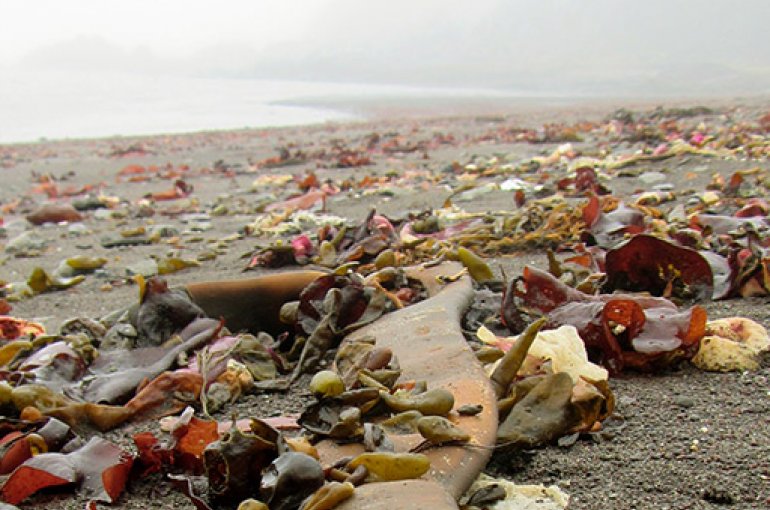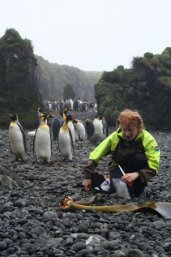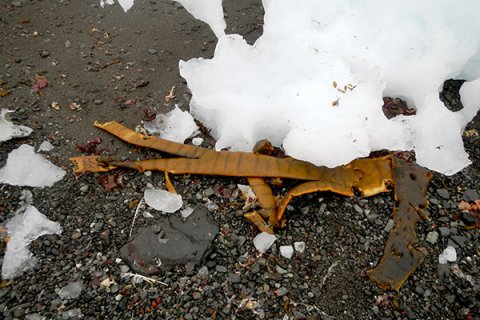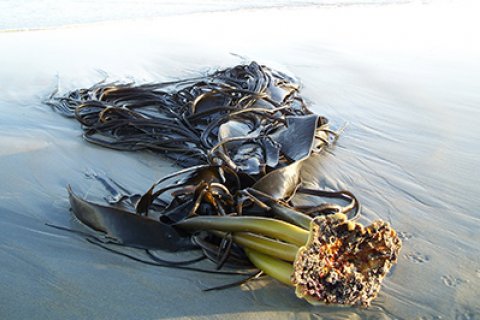Foreign kelp found on Antarctica after record journey of 20,000 km
Antarctic ecosystems more vulnerable than assumed

When Chilean researcher Erasmo Macaya stumbled upon foreign kelp washed up on an Antarctic beach, he knew he had found something significant. With an international team, including Utrecht oceanographer Erik van Sebille, Macaya found out that the kelp had drifted 20,000 km to the Antarctic shore: the longest known biological rafting event ever recorded. The results are published in Nature Climate Change on 16 July.
To get to Antarctica, the kelp had to pass through barriers created by polar winds and currents that were, until now, thought to be impenetrable. It means Antarctica is not as isolated from the rest of the world as scientists have thought, which has implications for how Antarctic ecosystems will change with global warming.
Plastic waste
The results might have implications for floating plastic debris too. While there are few sources of plastic litter on Antarctica itself, there are garbage patches in the South Atlantic and South Pacific, just a few 1000 km north of Antarctica. “The storms and Stokes drift that transport the kelp could also transport plastic debris to Antarctica, putting extra pressure on the vulnerable ecosystem there”, says Erik van Sebille of Utrecht University. “This is something we need to find out urgently.”

Ecosystem
“This finding shows us that living plants and animals can reach Antarctica across the ocean, with temperate and sub-Antarctic marine species probably bombarding Antarctic coastlines all the time,” said lead author Crid Fraser from the Australian National University (ANU). “We always thought Antarctic plants and animals were distinct because they were isolated, but this research suggests these differences are almost entirely due to environmental extremes, not isolation.”
Cutting-edge modelling techniques
Strong westerly winds and surface currents are expected to drive floating objects north and away from Antarctica. But when the disruptive influence of Antarctic storms is factored in, that all changes. Using cutting-edge modelling techniques, the team began to see how large waves arising during storms could help kelp rafts to reach Antarctica.

“I knew when I saw this floating seaweed – southern bull kelp – that it was important,” said Macaya. “The kelp does not grow in Antarctica but we know it can float, and can act as a raft, carrying many other intertidal plants and animals with it across oceans. If those rafts can make it this far, we could soon see massive changes in Antarctic intertidal ecosystems.”
Surface motion
The research has important implications for the science of ocean drift that is used to track plastics, aeroplane crash debris and other floating material across our seas. “These findings could change the way we model oceanic surface movement,” said co-author Andy Hogg. “If this wave-driven surface motion – known as Stokes drift – influences the movement of particles around Antarctica, it could be important for other stormy seas too.”

Tens of thousands of kilometres
DNA samples taken from the kelp revealed that one specimen drifted all the way from the Kerguelen Islands in the southern Indian Ocean, and another from the South Georgia islands in the southern Atlantic Ocean. This meant the routes they took to reach Antarctica must have been tens of thousands of kilometres long. “These are astonishing voyages, but worrying too,” Fraser said. “They show that Antarctic ecosystems could be more vulnerable to global warming than we had suspected. Parts of Antarctica are among the fastest warming places on Earth. If plants and animals get to Antarctica fairly frequently by floating across the ocean, they will be able to establish themselves as soon as the local environment becomes hospitable enough.”
Publication
Antarctica’s ecological isolation will be broken by storm-driven dispersal and warming
Nature Climate Change, 16 July 2018, DOI 10.1038/s41558-018-0209-7
Ceridwen I. Fraser, Adele K. Morrison, Andrew McC Hogg, Erasmo C. Macaya, Erik van Sebille*, Peter G. Ryan, Amanda Padovan, Cameron Jack, Nelson Valdivia & Jonathan M. Waters
* Utrecht University

